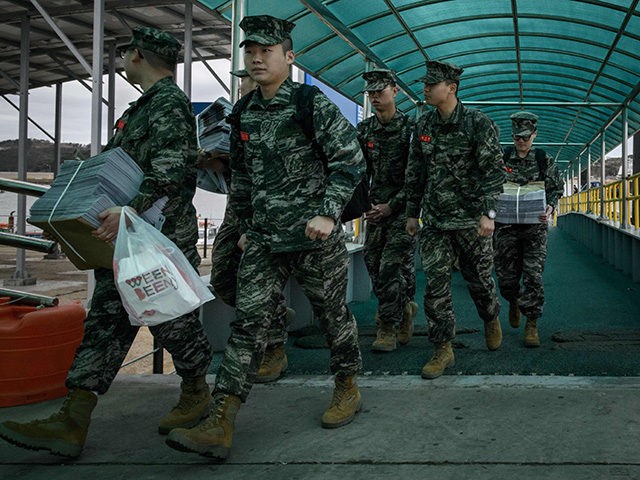The government of leftist South Korean President Moon Jae-in announced this weekend that it would cut the number of ground troops in the nation’s armed forces by 118,000, significantly reduce the number of high-ranking military officials, and scrub a plan to prepare for an invasion of Pyongyang.
South Korea’s Chosun Ilbo newspaper reported on Monday that the plan would also reduce the required amount of military service by two to three months. “The plans envisage reducing ground troops, slimming the command structure by getting rid of some 18 percent of idle generals and shortening mandatory military service from 21 months to 18 by the end of 2021,” Chosun explains.
The newspaper notes that Seoul appears to be particularly targeting bloat in the Army, not all the armed forces, as the army “plays a smaller role in modern warfare than it used to.” The reductions will leave South Korea with 365,000 ground troops.
“The ministry plans to make up for the troop reduction by reinforcing unmanned surveillance, including dronebots and unmanned reconnaissance aircraft, and augmenting firepower,” an unidentified Army officer told Chosun.
Moon announced the reforms in a speech on Friday, proclaiming that the Korean military would “inevitably fall behind” if it did not reform significantly as soon as possible. The cuts would not only affect ground troops, but high-ranking soldiers. The plan reportedly also requires South Korea to cut the number of generals in all the armed forces from 436 to 360 by 2022.
“While there are efforts underway for peace on the Korean Peninsula, it is also true that unconventional and potential threats are on the rise in reality,” Moon told an audience of top military officials. “The fourth industrial revolution standing before us will completely change the paradigm of war and national defense.”
According to South Korea’s JoongAng Ilbo, the new plans Moon promised the military would draft to adapt to the times includes a military assault on North Korea with no aid from the United States, which the newspaper described as “ambitious.”
“The so-called Multidimensional Mobile Operation would send two brigades to Pyongyang by air in choppers and planes of the Army and Air Force,” Joongang explains. “Marines would make amphibious landings while also sending units across the border to reinforce airborne units. In the plan, the military envisions taking control of Pyongyang within two weeks.”
Moon also disposed of controversial plans drafted under conservative predecessor Park Geun-hye for martial law, in the event that such a move was needed. Moon called the plans an “outdated and unlawful aberration,” according to Dong-A Ilbo.
The new plan appears to be an evolution of plans the Defense Ministry announced in January to modernize the military.
Chosun, which typically represents the South Korean right, notes that conservatives are “up in metaphorical arms” that Moon would significantly handicap the military at a pivotal time in North-South relations.
“It’s ground troops that will seize the hill, no matter how advanced state-of-the-art weapons are. The government should have carried out troop reductions more prudently in line with North Korean arms reductions,” Shin Jong-woo of the Korea Defense and Security Forum told the publication.
In an editorial, Chosun also condemned the plan on Monday, arguing that it leaves Seoul “dangerously exposed” to attack from not just the North Koreans, but several belligerent neighbors. The newspaper notes that a Chinese military aircraft violated South Korea’s airspace as recently as this weekend, spending four hours illegally inhabiting South Korean airspace, forcing Seoul to lodge a formal complaint with Beijing.
“Russia has also been testing the limits,” Chosun noted. “On July 13, two Russian bombers breached the South Korean ADIZ [Air Defense Identification Zone] four times without warning. The ADIZ does not delineate official air space, but it is customary for aircraft to identify themselves to the host country before entering it. Russia and China continue to snub this perfectly reasonable practice.”
“The security dynamics in Northeast Asia can fluctuate violently. In this environment a rock-solid defense is essential,” the Chosun editorial concluded. “But the government here has such a starry-eyed outlook for the Northeast Asian political landscape that it is willing to slash troops even though North Korea has no intention of scrapping its nuclear weapons.”

COMMENTS
Please let us know if you're having issues with commenting.